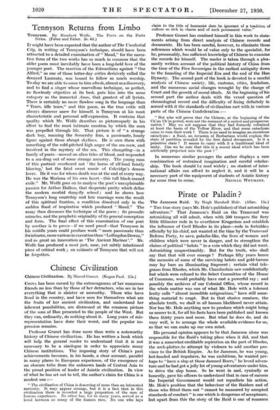Pirate or Paladin ?
The Jameson Raid. By Hugh Marshall Hole. (Allan. 15s.)
" THE true story (says Mr. Hole's publisher) of that astonishing adventure." That Jameson's Raid on the Transvaal was astonishing all will admit, when with 500 troopers the fiery little filibuster rode in to overthrow Krugerism and establish the influence of Cecil Rhodes in its place—rode in forbidden officially by his chief, not wanted at the time by the Transvaal Reform Party, to save, paladin-like, the lives of women and children which were never in danger, and to strengthen the claims of political "helots " to a vote which they did not want. Astonishing unquestionably. But for the truth, who shall say that that will ever emerge Y Perhaps fifty years hence the memoirs of some of the surviving helots and gold-barons may lay bare an illuminating fragment ; certain vital tele- grams from Rhodes, which Mr. Chamberlain saw confidentially but which were refused to the Select Committee of the House of Commons, would probably have cast a powerful ray ; and possibly the archives of our Colonial Office, whose record in the whole matter was one of what Mr. Hole with a tolerant lenity calls " almost incredible astigmatism," have still some- thing material to erupt. But to that elusive creature, the absolute truth, we shall in all human likelihood never attain. Nor has Mr. Hole anything new to produce which might bring us nearer to it, for all his facts have been published and known these thirty years and more. But what he does do, and do very well, is to arrange the whole available evidence for us, SO that we can make up our own mind.
His personal opinion appears to be that Jameson alone was responsible for the Raid's taking place when it did, and that it was a somewhat creditable aspiration on the part of Rhodes, the arch-plotter, to attempt by violence to add another pro- vince to the British Empire. As for Jameson, he was young, hot-headed and impulsive, he was ambitious, he wanted per- haps to "have a slap at those damned Boers," he loved adven- ture and he had got a jolly lot of young adventurers under him, to drive the slap home. So he went in and, cynically or honestly, gave his officers to understand that in case of success the Imperial Government would not repudiate his action. Mr. Hole's position that the behaviour of the Raiders and of those who fitted them out " cannot be measured by accepted standards of conduct " is one which is dangerous of acceptance, but -apart from this the story of the Raid is one of romance
and pluck, and Mr. Hole adds one more to his previous two successful books on South Africa by telling the tale pictur- esquely and, despite a natural bias in favour of his old chief, with perfect honesty.
While entirely willing, as regards Jameson, to put the Raid between brackets as a temporary aberration," the whole affair is not a matter on which we can congratulate ourselves, or one out of which we came with perfectly clean hands. A British subject, by wilfully violating the territory of a friendly neighbour, had committed an international crime, but owing to the muddled blundering of himself and his accomplices the attempted piracy failed, the crib was not cracked. We then proceed to try judicially six of the leading pirates (or burglars), and inflict on them sham sentences, though Execution Dock a hunched years before had often been adorned for lesser offences ; and finally we round off the whole matter with an investigation by a Select Committee of the House of Commons which investigates much and produces next to nothing. Mean- while the Boers, on their side, had on the whole behaved with humanity artfully blended with astuteness, though their previous dealings with the helot Uitlanders had been in many ways oppressive. President Kruger, who comes out of the business with flying colours and with his State shaken a little more free from the clutches of the British, puts in a demand for " moral and intellectual damage," to the tune of £1,677,938 3s. 8d. (which yet remains unpaid); and with the hatred of the Transvaal Boer still more sharpened against the English and with his contempt for the rooineks appreciably heightened by his being able to add the easy victory over Jameson at Doom Kop to the earlier triumph of Majuba, the stage is set for the inevitable big war which came four years later. It only remained, as the crowning horror of the situation, or perhaps the necessary touch of opera bouffe, for the Laureate of the day to write : I suppose we were wrong, were madmen, Still I think at the Judgment Day, When God sifts the good from the bad men, There'll be something more to say.
We were wrong, but we aren't half sorry, And as one of the baffled band, I would rather have had that foray Than the °millings of all the Rand.
Mr. Alfred Austin could always be depended on.
M. J. C. M.



































 Previous page
Previous page